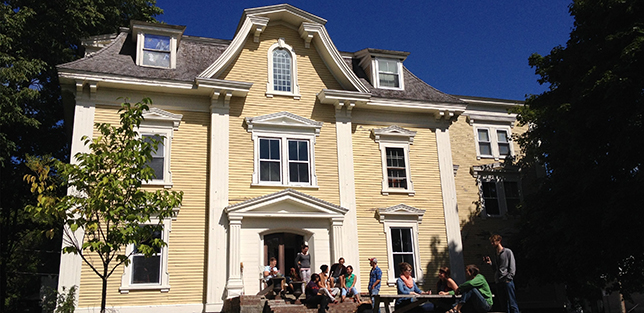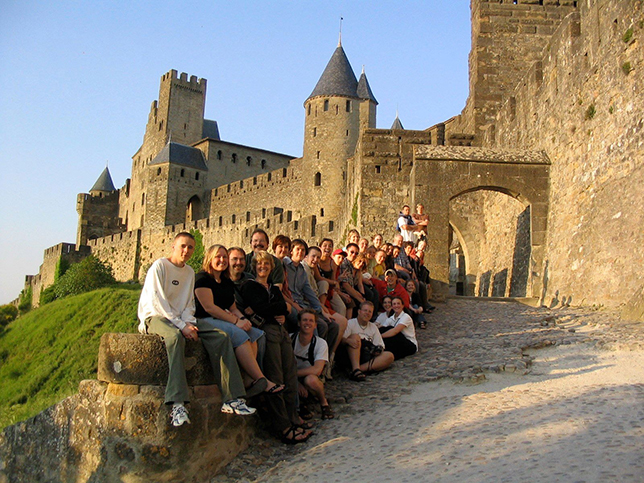As you enter the small community of St. Stephen, New Brunswick, on the border with Maine, one of the first things you’ll notice is an imposing Italianate-style mansion set on a hill overlooking the St. Croix River that separates the two countries.
Built for a local merchant in 1886, the building became a boarding house for immigrant workers at the nearby Ganong Bros. chocolate factory, and then a hotel in which Marylyn Monroe and Joe DiMaggio reportedly stayed, before being bought by St. Stephen’s University in 1975.
Still retaining many of its original features, the building now houses student dorms, a kitchen, dining hall, classrooms, offices, library and recreation rooms. Affectionately known as “The Big Yellow House,” it is the hub of university life here. There are two other smaller buildings directly next door used as residences and the three buildings together make up the entirety of the SSU campus.

Billed as the smallest university in Canada, and possibly even the world, it’s likely that most people have never heard of SSU. But, as one of three private chartered universities in New Brunswick with the authority to grant bachelor’s and master’s degrees, SSU has been offering for more than 40 years a decidedly different educational experience than what’s on offer at a traditional university.
“We’ve been intentionally small from the start,’’ says Jeremy Barham, vice-president, marketing and communications, at the university and a former SSU graduate. “Smaller is better when it comes to university.’’
Up to 30 new students are enrolled each year, but since many students are travelling abroad as part of their studies, there are usually no more than about 60 on campus at any one time, along with 11 faculty and 17 adjunct faculty members.
The university offers a Bachelor of Arts in humanities, international studies and psychology, along with diploma and postgraduate degrees in religious studies, and graduate and undergraduate certificates in religion, peace and justice. Mr. Barham says St. Stephen’s degrees are recognized by other Canadian universities and he boasts that its students often receive significant scholarships for graduate studies because they stand out from students from other universities.
Graduate Luke Wilson of Carlisle, Ontario, says St. Stephen’s provided him with a valuable foundation for further education. “When I graduated, I worried that other schools might pick me last for acceptance or that I wouldn’t be ready for an institutional education. But, I have since attended three universities and found myself teaching other students because of my interdisciplinary experience-based education from SSU.’’
Zachari Smith of Kelowna, British Columbia, has similar praise, saying the last four years at the university have been “a privilege for me.” He adds: “The friends I’ve made have deeply affected my life, while the travel and course material have begun [for me] a life-long journey in learning.’’
Although Christianity is at its core, the university says students of all different faiths and backgrounds are welcome; there are no religious or statement of faith requirements. It operates on a first-come, first-served basis, says Mr. Barham, and acceptance is based more on enthusiasm and interest than academic performance.
“Christian universities can be quite exclusive and have lots of rules, but SSU is almost the opposite of that,’’ says Mr. Barham. “It is very inclusive and welcomes all varieties of spirituality so that everyone feels accepted and included. … We get a broad spectrum of students here. There aren’t any labels at this university.’’
One of the aspects that sets SSU apart from other Canadian universities is that it offers a seven-week, fully integrated study abroad Europe and Asia as part of all its degrees. Students travel as a class to multiple countries, during which time they take five full courses to broaden their worldview. Students stay at hostels and missions while abroad, as well as with local families where they are immersed in the culture and language.

“We want our students to see and appreciate the way other people live and think,’’ says Mr. Barham. “It’s a unique, hands-on learning experience.’’
After several decades of offering the study abroad option, Mr. Barham says they’ve figured out a way of doing it as inexpensively as possible – about $1,000 over and above the regular tuition of $18,000 a year.
Another unique feature of SSU is the close-knit community that’s created there, says Mr. Barham. Students live, cook, eat and clean together, which helps them bond and keep operating costs down. Class sizes and the community are so small that professors get to know students by name.
“No one falls through the cracks,’’ says Mr. Barham, who graduated from SSU in 2002 and, like many of its graduates, chose to stay in St. Stephen after completing his degree rather than returning to his native England. “It offers a warm, loving community that helps students grow and a faculty that takes the time to get to know them.’’
Although he says he has seen stronger academics elsewhere, faculty member David Moore praises SSU for its commitment to educating the “intuitive side” of students. “There’s real value in that,” he says. “It lacks by far the number of undergraduate curricular options that a large university provides, like the University of California campus where I attended. Still, had I had the option, this would have been the school for me, because a primary reason for being in university is to learn how to learn, and to develop a love for it.’’
With little to no marketing budget, SSU has had to rely mainly on word of mouth from its graduates over the past four decades. They’ve managed to make it work, but Mr. Barham says he would like to have the opportunity to talk to more parents who attended a regular university and share with them all that make SSU special.
“We simply want students to think about stuff that really matters and shapes our lives, like faith, identity, worldview and purpose,’’ he says. “We try and create a context of curiosity in which questioning this sort of thing is normal.’’